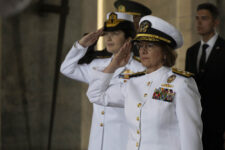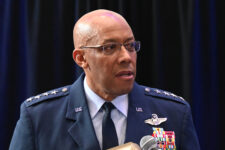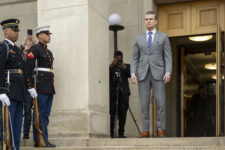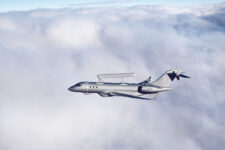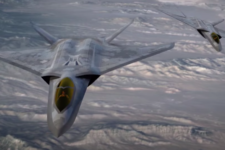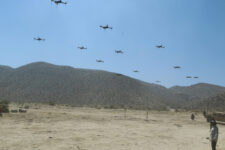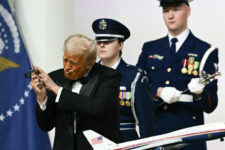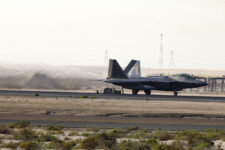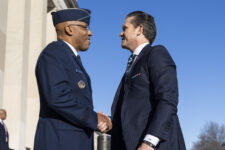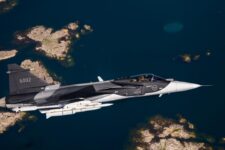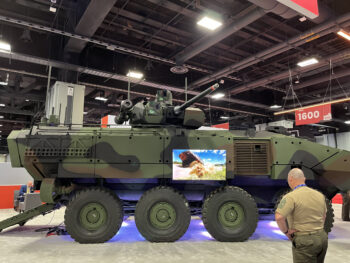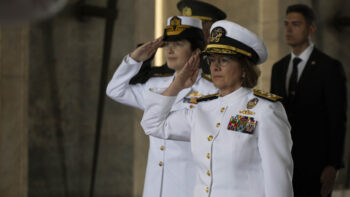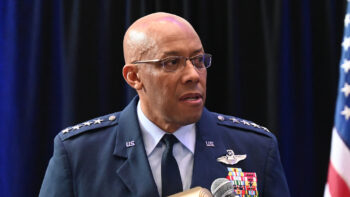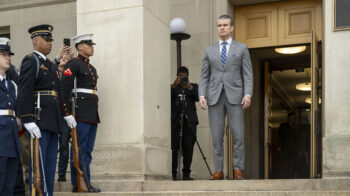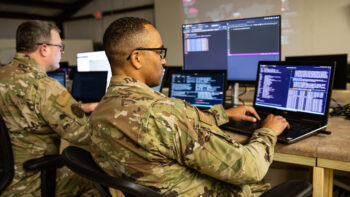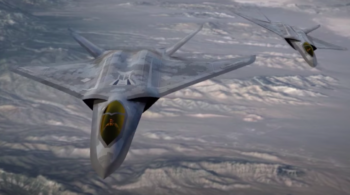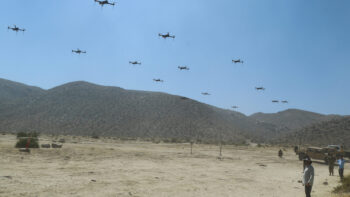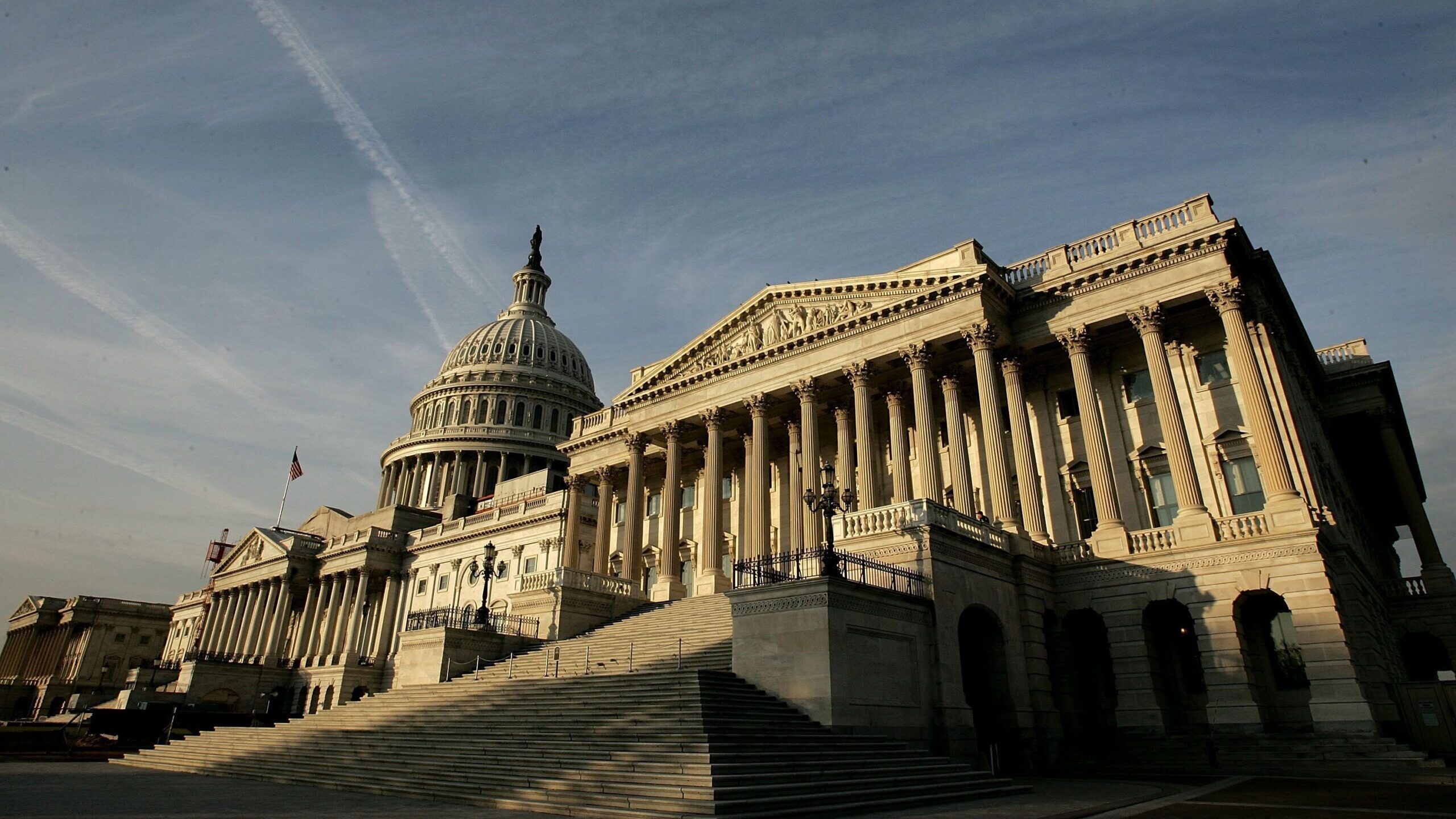
The early morning sun strikes the U.S. Capitol November 6, 2006 in Washington, DC. (Photo by Win McNamee/Getty Images)
WASHINGTON — The Senate today confirmed a trio of top military nominees, breaking through a blockade on confirmations lodged by Republican Senator Tommy Tuberville of Alabama.
Leading the action this morning was Navy Adm. Lisa Franchetti, who was confirmed as the chief of naval operations 95-1. The upper body also cleared Air Force Gen. David Allvin as the service’s next chief of staff, which fills the ranks of the Joint Chiefs of Staff for the first time since July 10, a historic gap that critics of Tuberville’s hold say has impacted national security.
Finally, Senators voted 86-0 to promote Marine Corps Lt. Gen. Christopher Mahoney to general and confirm him as the Marines’ assistant commandant. Like other nominees, Mahoney has been held up in the Senate, but members began a push to speed his confirmation vote to the front of the line following news that Commandant Gen. Eric Smith was hospitalized on Sunday.
The nominations of the officers, as well as 375 others as of Monday, have been stalled in the Senate after Tuberville launched a blanket hold on officer promotions in February as a protest against a Pentagon policy that provides leave and travel reimbursement for service members who seek abortion services.
Similar to a previous breakthrough in Tuberville’s hold, Senate Majority Leader Chuck Schumer, D-N.Y., started filing for cloture on the nominees after Republicans moved to advance a cloture vote on their own. The cloture process allows the Senate to end debate on each nominee and then proceed to a formal vote to confirm the respective nominations.
Tuberville has long insisted that the Senate could circumvent his hold by advancing nominees individually, which is how the three nominees in September were ultimately confirmed and how the trio today was pushed through. But Tuberville’s critics counter that moving each nominee individually — rather than the standard process of confirming large groups of nominees simultaneously — is a time-consuming process that would effectively shut down any other business for the Senate. The Congressional Research Service estimated in August that doing so would take 89 days of floor time, a number that has likely grown as more officers have been held up.
To get around Tuberville’s hold, Schumer is pushing for a vote on a resolution that would enable the Senate to confirm large groups of military nominees. But the fate of that legislation is unclear, as it would require Republican support to clear a filibuster.
In an intense, public display of party in-fighting, Sens. Dan Sullivan, R-Ala., Joni Ernst, R-Iowa, Todd Young, R-Ind., and Lindsey Graham, R-S.C., all took to the Senate floor for several hours Wednesday night to try to individually advance the nominations of 61 officers caught up in Tuberville’s holds. The senators cycled between praising the officers for their service, attacking Defense Secretary Lloyd Austin for the Pentagon’s policies on abortion and sharply criticizing Tuberville for punishing people who have no control over the policies in question.
In all 61 instances, Tuberville objected to moving the nominations forward — something Sullivan described as a “national security suicide mission.”
“My Republican colleagues and I may disagree on policy, but I admire the patriotism of the senators who spoke up tonight,” Sen. Jack Reed, D-R.I., chairman of the Armed Services Committee, said in a statement that night. “They demonstrated their commitment to faithfully serve those who volunteer and sacrifice so much to defend our nation.”
Franchetti, Allvin and Mahoney will take over at a pivotal time for the US military, with wars in Ukraine and Israel raging and a potential third conflict in the Indo-Pacific lurking in the years ahead if China moves to conquer Taiwan.
Franchetti Steps Up
Franchetti, who was her service’s vice chief, has been acting as the chief of naval operations since mid-August when former CNO Adm. Michael Gilday retired. Her successful confirmation means she will be both the first woman to lead the Navy and the first woman to serve on the Joint Chiefs of Staff.
Now-retired Adm. Michelle Howard was the first woman to become the vice chief of naval operations. Coast Guard Adm. Linda Fagan was the first woman to lead a branch of the US military; however the Coast Guard operates under the Department of Homeland Security rather than the Defense Department, and is not represented on the Joint Chiefs.
Franchetti, a career surface warfare officer and native of Rochester, NY, previously commanded US Naval Forces Korea as a one-star officer and later US 6th Fleet, based in Naples, Italy, as a three-star. She was selected to lead the Navy over Adm. Samuel Papparo, who was reportedly Defense secretary Lloyd Austin’s pick; Papparo was subsequently tapped to become the next commander of US Indo-Pacific Command.
Harry Harris, the former US Pacific Command chief and ambassador to South Korea, previously told Breaking Defense of Franchetti’s nomination that “I’d say, without equivocation, there’s no one better prepared to be the 33rd CNO.”
Although today’s votes will result in Franchetti taking the reins of the Navy, she will still be left without a fully-confirmed vice chief indefinitely. Vice Adm. Jim Kilby was previously nominated by the White House for that position, but remains mired in Tuberville’s hold.
A Cargo Pilot As Air Force Chief
Allvin, the Air Force’s current No. 2 officer, was tapped by President Joe Biden in July to take the reins as the Air Force’s chief of staff. Allvin will now assume the role left vacant by CQ Brown, who became chairman of the Joint Chiefs of Staff last month. (Allvin has served as acting Air Force chief of staff since Brown’s exit.)
A former cargo pilot with previous stints at European Command as the director for strategy and policy, and at the Pentagon as part of the Joint Staff among other roles, Allvin’s confirmation ends a streak of Air Force chiefs with a fighter pilot background. He was reportedly Brown’s favored pick for the role, and is tasked with taking over leadership of the service during a period of profound transformation.
As service chief, Allvin is now charged with organizing, training and equipping a force that has missed its recruiting goal for the first time in over two decades. Its planes are also aging out, with a pressing need to recapitalize legacy tankers, surveillance aircraft, fighter jets and other platforms.
Under service secretary Frank Kendall, the Air Force is also pursuing seven “operational imperatives” to modernize the Air Force and Space Force as a potential conflict with China looms. One of the leading initiatives Allvin is now tasked with implementing is agile combat employment, a concept where operations would be more dispersed to prevent an attack on a base from crippling regional operations that is seen as a critical tactical shift, particularly in the Pacific.
Kendall has further pushed a wholesale revamp of the Air Force and Space Force to “optimize” it for “great power competition,” which Allvin will now be charged with carrying out for the Air Force as its top uniformed officer. The Secretary has said that recommendations should be ready early next year, followed by an immediate implementation phase.
Mahoney: Marines Corps No. 2 And Acting Chief
For the Marine Corps, Lt. Gen. Christopher Mahoney, a career aviator and previous 3rd Marine Air Wing commanding general, received a fourth star and will serve as the service’s No. 2 officer.
Mahoney was serving as the deputy Marine Corps commandant for programs and resources at the Pentagon. He has accrued 5,000 flight hours in A-6s, F-5s, F-18s and the F-35, according to his official service biography.
His confirmation as the assistant commandant of the Marine Corps comes just days after Commandant Gen. Eric Smith was hospitalized. Some media outlets have reported Smith suffered a heart attack, but the service has not yet publicly confirmed that reporting.
Following Smith’s hospitalization, the Marine Corps announced Lt. Gen. Karsten Heckl had temporarily assumed the duties of the commandant. Given his new promotion and assignment as vice chief, Mahoney will likely take over that role from Heckl until Smith returns to work.
Since the previous commandant, Gen. David Berger, retired in July, Smith has publicly discussed the stress of trying to serve as both the service’s chief and vice chief simultaneously. Despite now technically having a fully confirmed commandant and assistant commandant, that stress will ostensibly fall on Mahoney’s shoulders.
UPDATED 11/2/23 at 3:07 PM ET with the confirmation votes of Gen. David Allvin and Lt. Gen. Christopher Mahoney
Hegseth fires Navy’s top officer, Air Force No. 2
The firings of Adm. Lisa Franchetti and Gen. James Slife follows tonight’s removal of Gen. CQ Brown as chairman of the Joint Chiefs of Staff.
